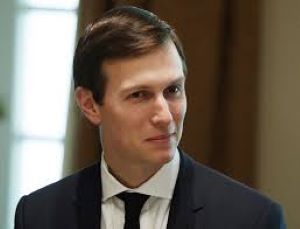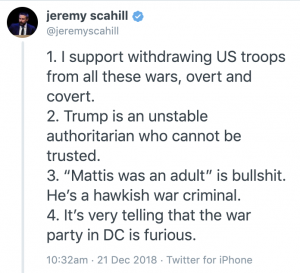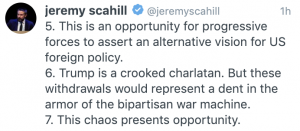The Forgotten Coffee Boy Errands
Among the things Steve Bannon has lied about most assiduously was the role George Papadopoulos played in setting up a fall 2016 meeting with Abdel Fattah el-Sisi. The first time he was asked about the Egypt meeting in a February 2018 interview with Mueller, he gave Jared Kushner credit. Later in the same interview, Bannon claimed he,
would generally blow off Papadopoulos and thought to himself “I don’t need this guy.” Flynn would be on the hook for the meetings Papadopoulos was suggesting, and Bannon didn’t need Papadopoulos.
Bannon transitioned immediately from that claim to disavowing advance knowledge of the emails Russia had.
Papadopoulos never told Bannon about the Russians having dirt on Clinton, and Bannon never heard Papadopoulos tell anyone in the campaign, such as Sam Clovis, that the Russians had dirt on Clinton.
Of course, by the time Bannon joined the campaign proper, he was already talking to Roger Stone about Russia dealing emails.
In an interview with SSCI, Bannon told even more ridiculous lies about Papadopoulos’ role in the el-Sisi meeting. When asked about a sustained thread between him and the Coffee Boy around the meeting, Bannon claimed he had accidentally emailed Papadopoulos about the meeting when he intended to email someone else.
Between September 16, 2016, and September 18, 2016, Papadopoulos and Bannon exchanged dozens.of messages relating to a potential engagement between President El~Sisi of Egypt and Trump, ultimately confirming a dinner meeting at 9:00 p.m. on Monday, September, 19, 2016. During this email exchange, Bannon asked Papadopoulos to email a briefing in advance of the meeting with President El-Sisi, which Papadopoulos sent noting that “while in Athens over dinner with Greek defense minister last May, he personally introduced me to the Egyptian defense minister and the rest became monthly consultations with the Egyptians in DC.” There are an additional two email messages related to this conversation that were redacted when produced to the Committee. Bannon told the Committee that he mistook Papadopoulos for a separate Campaign staffer and never meant to engage with Papadopoulos on this issue. Bannon Tr., pp. 95-98.
At the time then, Papadopoulos told Bannon that his ties with Egypt started back in May, when he was in Greece the same day as Putin and when he bragged to Greece’s Foreign Minister that the Russians had Hillary’s emails.
These same ties were key to the role that Papadopoulos played during the Transition, when he was hoping Flynn would hire him for a key NSC job on energy (hopes for that job is the excuse he later used for lying to the FBI). He had at least two more substantive discussions with Bannon in this period, one on and following December 9, and another on and following January 4.
Papadopoulos, however, was about to travel to Greece, and was keeping senior members of the Trump Transition Team apprised of his engagements. On December 9, 2016, Papadopoulos passed on a purported request from the Prime Minister of Greece to meet with President-Elect Trump in early January 2017 to Bannon.3415 In an email the following day, December 10, 2016, Papadopoulos further stated that he “[s]poke with the Greek defense minister.3416 They want to sign a government to government agreement with the USA for all rights to all energy fields offshore. Strategic foothold in the Mediterranean and Balkans.”3417 Bannon replied to the note, adding Michael Flynn and Kathleen Troia (K.T.) McFarland to the communication, both of who were-senior national security officials on the Transition Team.3418 Papadopoulos then wrote to the group on December 10, 2016, that the Greek defense minister had “earmarked the island of [K]arpathos for a potential listening post and air base for the US” and further stated “A base on [K]arpathos is key to controlling sea lines of communication in the Aegean/plan b should Incirlik once again become unusable.”3419 The following day, December 11, 2016, Papadopoulos wrote to Flynn’s Transition Team email address, passing along the phone number for Kammenos, the Greek Defense Minister, noting that the “[l]ine is not secure, however. He can pass along a secure number when you both find the time to discuss.”3420
Papadopoulos again reached out to Bannon on January 4, 2017, relaying a request from the Greek Foreign Minister for a phone call with Trump. 3421 Bannon responded, adding Flynn, which Papadopoulos used to also request a meeting with the Egyptian ambassador .. 3422
3415 (U) Email, Papadopoulos to Bannon, December 9, 2016 (B&P GP F:ile 2018 000609).
3416 (U) According to Greek press reporting, Papadopoulos and Kammenos had lunch in Piraeus on Saturday, December 10, 2016, where Papadopoulos described himself as a “representative of Trump.” Kourdistoportocali.com, “World Exclusive: George Papadopoulos. and Panos Kammenos in ‘Dourabei, ‘” December 10, 2016.
3417 (U) Email, Papadopoulos to Bannon, December 10; 2016 (B&P GP File 2018 000609).
3418 (U) Email, Bannon to Papadopoulos, Flynn, McFarland, December 10, 2016 (B&P GP File 2018 000609).
3419 (U) Email, Papadopoulos to Flynn, Bannon, McFarland, and Kellogg, December 10, 2016 (B&P GP File 2018 000610).
3420 (U) Email, Papadopoulos to Flynn, December 11, 2016 (B&P GP File 2018 000610).
3421 (U) Email, Papadopoulos to Bannon, January 4, 2017 (B&P GP File 2018 000635).
3422 (U) Email, Bannon to Papadopoulos and Flynn, January 4, 2017 (B&P GP File 2018 000635); Email, Papadopoulos to Flynn and Bannon, January 6, 2017 (B&P GP File 2018 000635). [my emphasis]
The latter one, in which Papadopoulos wrote Bannon about Greece and Bannon then looped in Flynn, in response to which Papadopoulos also passed on a request from Egypt’s Ambassador, appears to be the email mentioned in an October 2016 warrant application targeting Mike Flynn.
Emails obtained pursuant to a judicially-authorized search warrant show that one or about January 6, 2017, a member of the Trump campaign team on foreign policy issues e-mailed [Flynn] and advised that a foreign government official had been asking to meet with FLYNN. Later that day, FLYNN responded to the Trump campaign member: “We’ll reach out and try to meet this coming week.” FLYNN’s response was also sent to [KT McFarland] and [Flynn’s scheduler Daniel Gelbinovich].
When Papadopoulos testified about this to the House, he left out the Egyptian part of things.
A So I never spoke about Russia at all with Michael Flynn, K.T. McFarland during the transition. It was about an energy project that the Greek Government wanted to discuss with the incoming administration, and that’s why I was put in touch — that’s my understanding of why I was put in touch with Michael Flynn during the transition over email to discuss this deal that, I guess, the Greek Government wanted to discuss with the higher-ups in the incoming administration about, I don’t know, giving U.S. companies rights to their energy reserves, something along those lines.
[snip]
Q Okay. So you never had a conversation or were aware of conversations with Michael Flynn relating to Saudi Arabia?
A To my recollection, the only interactions I had with Michael Flynn were regarding this Greek energy deal, and I think that’s documented in emails.
Even when asked specifically about who else he spoke with in the Transition, Papadopoulos left Egypt off, then claimed not to remember whether he had any meetings with Egyptian officials.
Q Okay. So you never had a conversation or were aware of conversations with Michael Flynn relating to Saudi Arabia?
A To my recollection, the only interactions I had with Michael Flynn were regarding this Greek energy deal, and I think that’s documented in emails.
[snip]
Q Any meetings with Egyptian officials?
A During the transition? I can’t remember, but it’s possible, because I had a very close network with them. But I can’t remember about Egypt in particular.
Given that an Egyptian bank may have given Trump a big infusion of cash after the first meeting, I can understand why everyone would be so forgetful about this meeting.
But given the likelihood all these people will lose their Fifth Amendment privilege after they get pardoned in the next few weeks, perhaps they can be asked to refresh their memory about why the Egypt operation was so closely tied to the Russian one.





